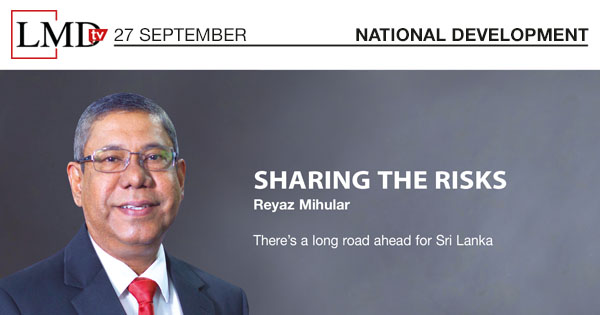
Public private partnerships (PPPs) are considered an efficient mechanism that facilitates the mobilisation of the private sector’s resources and expertise towards the country’s development initiatives.
Reyaz Mihular – the Chairman of Sri Lanka Telecom (SLT) and Bairaha Farms – views these partnerships as the “sharing of risks.” In a recent interview aired on LMDtv, he noted how PPPs often fail when risks aren’t shared and parties only focus on their contribution.
He explained the many risks involved in such projects: “There are some risks that the investor has to bear, which involve the money he or she puts in, and managing and completing a project on time to make sure that projected revenues are realised.”
He added: “On the other hand, the government also has to ensure that the facility the investor buys obtains relevant approvals.”
“PPPs that have succeeded are those where there have been proper sharing of risks,” Mihular contended, adding that such partnerships are also about “using available resources to generate revenues and the sharing of rewards by both parties.”
He believes that it is key for Sri Lanka to create a conducive environment to encourage private sector investment and thereby, more PPPs: “If I’m a PPP investor and I come to Sri Lanka, I wouldn’t worry too much about the crisis. I’d worry about the ability to generate revenue and people’s capacity to pay – rather than the government’s ability to repay loans.”
In addition to clearing roadblocks and red tape that arise due to Sri Lanka’s archaic regulations, which investors often have to deal with, Mihular stressed the importance of having the right mindset and being willing to institute changes.
He elaborated: “We have problems arising from politicians who ask for money and bureaucrats who always find ways to look at how it cannot
be done – rather than how it can be done.”
Mihular also noted that investors consider aspects beyond tax holidays. “For investors, what’s more important is the ease of doing business – and Sri Lanka is ranked 99th among 190 economies in this,” he lamented, adding that it is “not a very happy place to be.”
The Chairman of SLT and Bairaha Farms pointed to “big brother” India for examples of successful PPPs.
He explained: “India was far behind us but has galloped well past us. If you look at the example of Indian Railways, it is very advanced; and that’s because of very effective PPPs based on sharing revenue between the private and public sectors.”
PPPs are also useful in facilitating sustainability driven projects and environmental conservation initiatives, which is a high priority around the world and in Sri Lanka too. Mihular stated: “No business can survive if sustainability is not high on its agenda.”
And he noted that “it’s a no-brainer that sustainability must be a very important aspect that has to be examined before you launch a project. I believe that Sri Lankan businesses are increasingly looking at that more than they used to in the past. Today for example, businesses can’t simply expect to obtain all the necessary power from the grid so companies are increasingly looking at off-grid solutions.”
Indeed, Sri Lanka is at a critical juncture; and Mihular stressed the seriousness of the situation and that getting out of the crisis will not be an easy journey.
He acknowledged that “all of us feel the pain with taxes; you earn Rs. 100 to pay 35 rupees in taxes. It is a substantial component and has a big impact on our capacity to spend; but these are things that we have to do if we want to get out of what we’ve got ourselves into.”
“We have a big challenge ahead of us; we’re not out of the woods completely and we all need to put our heads together, and say this is our country and we’re going to make our future here,” Mihular urged.
He summed up: “This requires making the necessary sacrifices to get ourselves out [of the crisis] – there are no fancy solutions or silver bullets.”


